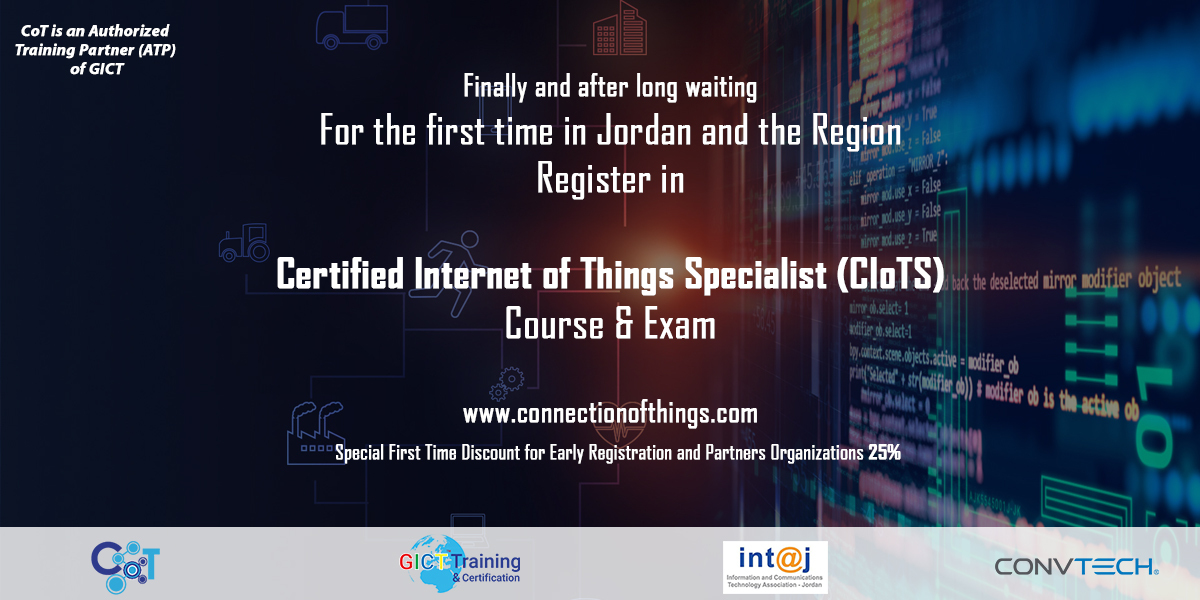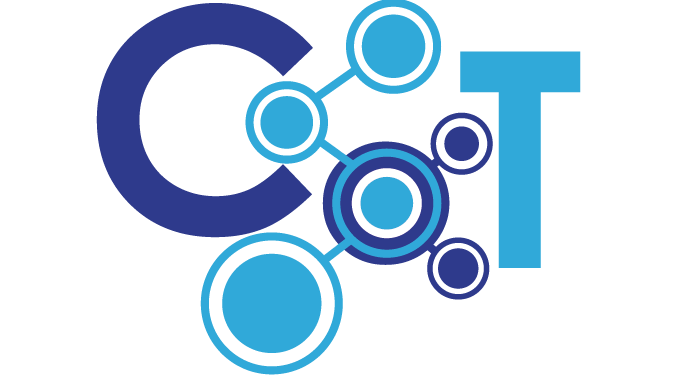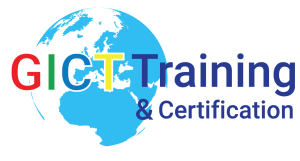Certified Internet of Things Specialist (CIoTS)


Connection of Things
is an
Authorized Training Partner (ATP)
of
Global ICT Training & Certification(GICT)

Overview
With the emergence of sensors technology and the advances in communication technologies and cloud computing, we are moving towards a new computing paradigm, which will involve trillions of connected devices – IoT, Internet of Things. IoT will transform and it requires rethinking of how we compute today.According to a report by Gartner, IoT will include 26 billion units installed by 2020, and by that time, IoT product and service suppliers will generate incremental revenue exceeding $300 billion, mostly in services.
In addition, International Data Corporation (IDC) has looked at the components, processes, and IT support for IoT and expects the technology and services revenue to expand from $4.8 trillion in 2012 to $7.3 trillion by 2017 at an 8.8% CAGR, with the greatest opportunity initially in the consumer, discrete manufacturing, and government vertical industries.
Asia Pacific and North America are estimated to contribute $92.8 billion and $56.3 billion, respectively, by 2017. These regions are forecast to grow at a CAGR of 33.2% and 28.3%, respectively, from 2012 to 2017. There will be a growing demand for expertise in IoT in the APAC region.
This course will focus on the core technologies behind Internet of Things. This certification leverages and explores the infrastructure, communication, sensor technologies, networking technologies, data/storage/analytics and security aspects of IoT in building the next-generation computing realm, which makes a world fully connected.
After the course, participants will have a good understanding of the different pieces of an IoT system and how they interact

Who Should Attend
- IT/IS Executives and Managers
- Business Analysts
- Project Managers
- Functional Managers
- Technology Planners
- Consultants and System Integrators
- IT Technical Services Specialists
- IT Architects
- Business Process Owners
- Risk Management Employees
- Cloud Operations Engineer
- Senior Cloud Operations Engineer
- Data Analyst – Statistics and Mining
- Data Analyst – Text Analytics
- Operations Research Analyst
Course Outcome
- Gain knowledge on the overview concepts and main components of IoT
- Obtain skills to set up Raspberry Pi, run Node-Red interface and send message using Raspberry Pi through MQTT
- Acquire knowledge on how to interpret product datasheet and identify key specifications of the product
- Be intensively familiar with the role of data mining, business analytics and big data technologies in IoT
- Acquire programming skills (Python/Arduino) for IoT
- Get skilled in writing program to interact with the sensors to accomplish set tasks
-
Software used: Arduino, Raspberry Pi, Blynk, Mosquitto MQTT, Ubuntu, RapidMiner


Pre-requisite
Participants are recommended to have preferably min. 2 years of experience in software development, business domain or data/business analysis. However, if you do not have any experiences, you can still consider taking up the course and we will advise you accordingly.
Course Details
- What is IoT?
- Effects of IoT
Course Duration
40 Hours
Course Outline
Introduction to IoT
- What is IoT?
- Effects of IoT
- Skill set for IoT
- Challenges and barriers to IoT
- Functional Requirements of IoT


Overview of IoT
- Communication aspects involved in IoT system
- Wired connectivity and technologies
- Wireless connectivity and technologies
- Power and Energy Management & Optimization
- Network Topologies for IoT
- IoT Protocols
- IoT – Technologies & Software
Components & Elements of IoT
- Components of IoT
- Elements of IoT
- Radio Frequency Identification (RFID)
- Wireless Sensor Networks (WSN)
- Addressing schemes
- Data, storage and analytics
- Visualization
- Security


Architecture of IoT system
- Internet of Things—Architecture – IoT-A
- The IoT-A Reference Model
- Cloud Computing
- Cloud Computing in Internet of Things
- Internet of Things with Cloud Architecture
- IoT-related Cloud Security Issues
- IoT-related Cloud Computing Privacy Issues
- Building a Private Cloud to enable IoT
- Business Analytics
- Business Analytics in IoT Architecture
- IoT and Data Mining
- Data Warehouse in IoT
- Data Visualization and Tools in IoT
- Data Mining Tool
- BA Techniques to empower IoT’s Analytical & Decision Making Capability
- Big Data Technologies
- Internet of Things and Big Data
- The IoT Process and its challenges
- Understanding Big Data
- Hadoop and MapReduce
- Apache HBase
Databases for IoT
- Big Data turning into “HUGE DATA”
- SQL Databases
- NoSQL Databases
- Cloud Databases


Mobile integration to enable IoT
- Mobile Middleware
- Omni-Channel Retailing
- Mobile Loyalty
- Mobile Point of Sale
- Mobile Inventory
- Real World Mobile Integration Examples
Security Aspects of IoT
- IoT Security Aspects
- IoT features leading to security issues
- Security Issues in IoT based on RFID
- Design Considerations for IoT Technologies


Privacy Aspects of IoT
- Privacy Analysis
- Data Loss – RFID, Bluetooth, Big Data
- Mechanisms to Prevent Privacy Hack
- Popular Privacy Legislations
- Case Study
- Privacy Enhancing Technologies (PET)
- Few Approaches to IoT Privacy
- Practical tips to Handle IoT Privacy
IoT Applications – Use Cases
- Smart Cities
- Smart Environment
- Smart Manufacturing
- eHealth


Assessment and Certification
- Component 1: Written Examination (MCQ)
- 40 Questions
- 1 Hour duration
- Closed Book
- Score 70% to pass
- Component 2: Project Work Component (PWC)
- Individual work
- 2 weeks to complete from the last day of course
- Score 70% to pass
- Certification
- Upon passing the course, you will be awarded “Certified Internet of Things Specialist”
- Certification body – Global Science and Technology Forum

